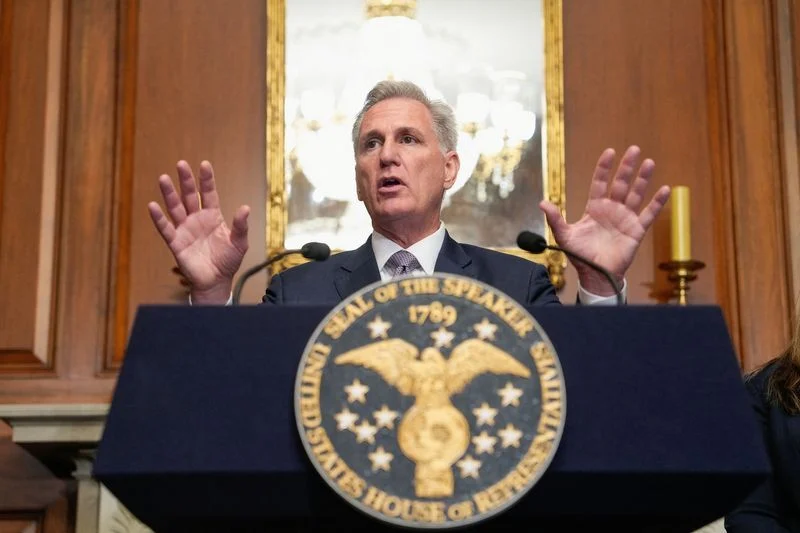House Speaker McCarthy’s Leadership Under Fire: A Deep Dive into the Ouster Threat
Introduction
In a surprising turn of events on Capitol Hill, House Speaker Kevin McCarthy, a prominent figure in U.S. politics, is facing a serious threat to his leadership. The recent passage of a 45-day stopgap funding bill has triggered internal turmoil within the Republican Party, with hardline members expressing discontent. This article delves into the intricacies of this political drama and explores the potential ramifications for McCarthy’s role as the Speaker of the House.
The Stopgap Funding Bill
The Republican-controlled House of Representatives recently voted 335-91 in favor of a 45-day stopgap funding measure, averting a looming shutdown of federal agencies. However, what caught the attention of political observers was the unexpected support from Democrats, outnumbering Republican endorsements. This unusual alignment has set the stage for internal dissent within the GOP.
Hardline Republican Criticism
Prominent hardline Republican Representative Matt Gaetz has openly expressed his dissatisfaction with McCarthy’s leadership. In a bold move, Gaetz announced his intention to file a “motion to vacate,” signaling a challenge to McCarthy‘s position as speaker. Gaetz’s critique goes beyond party lines, accusing McCarthy of aligning with what he calls the “Uniparty” of Washington.
McCarthy’s Political Maneuvering
McCarthy’s decision to bring forth a measure with potential Democratic support was a calculated risk. The Speaker, aware of the possibility of internal opposition, challenged his critics with a resolute statement: “Go ahead and try.” This strategic move, however, places McCarthy in a precarious position, navigating a delicate balance between bipartisan cooperation and internal party dynamics.
- “Navigating the Political Maze: McCarthy’s Strategy to Avert Government Shutdown”.
- “Eduardo Verastegui’s Political Odyssey: Navigating Mexico’s Right-Wing Landscape”.
Republican Hardliners’ Grievances
The passage of the bipartisan stopgap bill came on the heels of the failure of a Republican-backed measure. This bill, blocked by hardline Republicans, included substantial spending cuts and stringent immigration and border restrictions. The subsequent bipartisan success has fueled grievances among hardliners who argue that McCarthy compromised conservative values in favor of Democratic policies.
Democratic Response
The response from Democrats remains uncertain, adding an additional layer of complexity to McCarthy’s predicament. While some Democrats have hinted at potential support for McCarthy in turbulent times, others advocate for a more moderate Republican candidate willing to collaborate on power-sharing arrangements. The diverse Democratic stance reflects the complexity of the current political landscape.

Historical Precedents
The motion to vacate, a rare and impactful parliamentary procedure, has historical roots dating back to 1910. Its use by Speaker Joseph Cannon and the subsequent threat against Speaker Newt Gingrich in 1997 underscore its significance. The motion symbolizes a party’s internal struggle, forcing members to take a stand on the leadership question.
Potential Ramifications
The potential ouster of Speaker McCarthy could have far-reaching consequences for the Republican Party. The intricate interplay between party dynamics, bipartisan cooperation, and individual ambitions creates an unpredictable political landscape. The outcome of a vote to vacate the chair remains uncertain, leaving room for speculation about the future of Republican leadership in the House.
- “Navigating the Political Maze: McCarthy’s Strategy to Avert Government Shutdown”.
- “Eduardo Verastegui’s Political Odyssey: Navigating Mexico’s Right-Wing Landscape”.
The Way Forward
As the political drama unfolds, the central question revolves around the role of bipartisanship in shaping the fate of Speaker McCarthy. Representative Brian Fitzpatrick emphasizes the importance of rewarding leaders who promote two-party solutions, hinting at the underlying tension between cooperation and party loyalty. The intricate dance of political alliances will ultimately determine the trajectory of McCarthy’s leadership.
Conclusion
In conclusion, the threat to House Speaker McCarthy’s position marks a pivotal moment in U.S. politics. The complex interplay of party dynamics, historical precedents, and individual ambitions adds layers of uncertainty to the situation. As observers keenly watch the unfolding drama, the implications for the Republican Party and the broader political landscape remain significant.